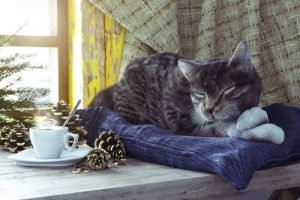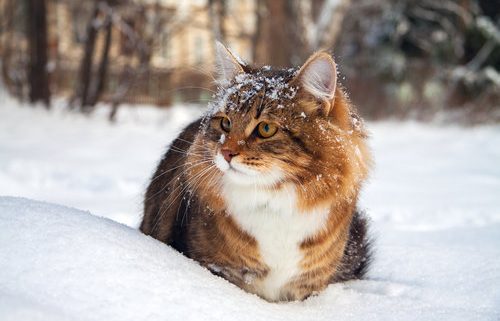Winter can affect indoor as well as outdoor cats. As a cat owner, it’s your responsibility to ensure that your cat stays healthy and safe during the long, cold winter months. In this post, we’ll discuss the best ways to take care of your indoor or outdoor when the temperature outside drops.
Outdoor Cat Tips
Outdoor cats can face a variety of problems when the temperatures drop below freezing. Frozen water and food, difficulty traveling in snow, lack of a warm place to sleep and other problems can be disruptive and even dangerous. To protect your outdoor cat in winter, do the following:
- Give your cat somewhere indoors to take shelter during snowstorms. You may give your cat a bed in the basement or the garage during this time. If you do, be sure to “cat proof” the space, removing chemicals like antifreeze and cleaning products.
- Give your cat a heated bed. If your cat sleeps in the garage or basement when the temperature outside is cold, giving your cat a heated bed can help him or her stay warm.
- Give your cat a heated bowl. Heated bowls prevent water from freezing when the temperature dips.
- Feed your cat dry food. Dry food doesn’t freeze, but wet food does. Giving your cat dry food during this time will help ensure that your cat has something to eat.
- Clear snow for your cat. If you get a lot of snow, your cat may find walking around outside to be difficult or impossible. Clearing a path for your cat will help him or her get exercise outside.
- Monitor the weather. If the temperature drops dangerously low outside, you may need to bring your outdoor cat into your home rather than leaving him or her in an unheated garage. Watch the weather forecasts and take action to bring in your cat to ensure that your cat is safe.
Indoor Cat Tips 
It’s thought that some cats can be affected by seasonal depression during colder, darker months. You may notice your indoor cat becomes a little distant or unhappy in winter. If this is the case, these tips may help:
- Leave the curtains open so it’s not too dark in the house during the day. This will help your cat get exposure to daylight while you’re away.
- If you turn down your furnace while at work, give your cat a warm or heated bed where he or she can sleep. Heated cat beds are commercially available. Keep your cat’s bed turned to a temperature that is more or less equal to your cat’s body temperature. Do not turn the heat up warmer than your cat’s normal temperature.
- Play with your cat more than usual. If you normally play with your cat once per day, make a point of playing or interacting with your pet multiple times per day.
- Keep the dryer closed. Dryers are tempting for cats seeking warmth in winter. Keep the dryer closed to keep your cat safe.
- Weatherproof your window sills. Many cats like to perch on window sills when it’s light outside. If this is the case for your cat, use weather stripping to cut down on drafts. This will help ensure that your cat is comfortable in his or her favorite sunning spots.
Join the National Animal Supplement Council
The National Animal Supplement Council supports proper pet nutrition through supplements and a healthy diet. We’re always looking for new members! To join the NASC, take a look at our website today.
The NASC Quality Seal
The goal of the National Animal Supplement Council (NASC) is to promote the health and well-being of companion animals and horses that are given animal health supplements by their owners, and to protect and enhance the integrity of the animal health product industry. When you see the NASC Quality Seal on animal health supplements, you can trust you are buying from a reputable company that has successfully completed an independent quality audit and has complied with rigorous requirements necessary to gain permission to display the Quality Seal. To learn more, and to access meaningful information on all aspects of health and wellness for dogs, cats and horses, visit AnimalHealthLive.com.



